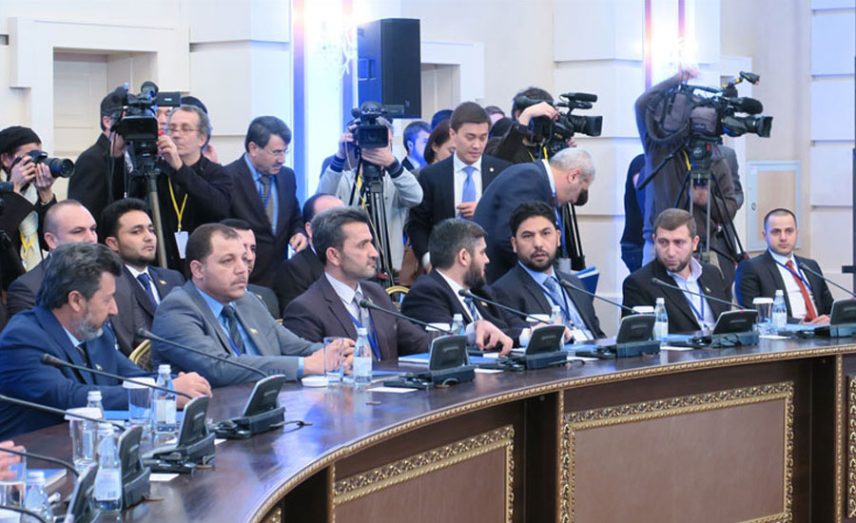One week separates us from the start of the negotiations between the Assad regime and the Syrian opposition in the fourth round of the Geneva conference, expected to be held on February 20.
The beginning of the talks was preceded by calls from the UN envoy to Syria, Staffan de Mistura, to the opposition to form a united delegation including its full spectrum without exclusion, accompanied by a threat from the envoy to form a delegation himself if the opposition fails. This has pushed the general coordinator for the High Negotiations Committee, Riyad Hijab, to react to de Mistura’s comments stating that forming the delegation is not within the envoy’s jurisdiction.
Three meetings led up to the Geneva talks, two in Astana, the first on February 6, between the guarantor parties — Russia, Iran, and Turkey — and the latest held last Wednesday with the regime delegation and Syrian rebel groups.
A recent meeting was also held in the Saudi capital Riyadh last Friday and Saturday for the High Negotiations Committee delegation and the delegation of rebel groups to Astana, to form the delegation that will participate in the Geneva talks.
Rumors preceded it, according to Arab media and outlets, that there were divisions and "tension" between the two delegations, manifested in the disagreement around the size of representation for each within the delegation.
However, rebel Colonel Ahmed Othman, leader of the Sultan Murad Brigade, and a representative within the Astana delegation, Zakaria Malahifyi, the head of the political bureau in the Fastaqim Union, denied to Enab Baladi that there were any disagreements.
However Malahifyi stated that the Astana groups "noted that they want greater representation within the opposition delegation to Geneva, but the discussion was normal."
Media meanwhile has circulated delegates' names in the absence of confirmation from the Syrian opposition. However the lawyer Mohamed Sabra told Enab Baladi that he was selected as chief negotiator and Nasser al-Hariri will be head of the delegation, with Alice Moufarrej as deputy head of the delegation.
Media reported that the delegation participating in Geneva would be 45 people distributed throughout three teams: The first a negotiating team that would be composed of politicians and some Astana rebel groups; the second a consultative team and including some of those groups who attended the Astana meeting; the third would be technical.
Cairo and Moscow platforms
In light of the UN calls to form a united opposition delegation, representatives of the Moscow and Cairo platforms sent a message to the United Nations Secretary-General, Antonio Guterres, about the failure to reach a final decision for the formation of the delegation.
The two platforms said in a statement on Friday that they had communicated with the High Negotiations Committee with the aim of "forming a united delegation on the basis of guaranteeing no one was excluded, and no one party dominated the joint delegation, however our communications, unfortunately, have not yet led to tangible results."
The two platforms proposed to the United Nations that the delegation be formed with three representatives from each platform (Riyadh, Moscow and Cairo) — a total of nine people — in addition to three representatives from the rebel groups who participated in the Astana conference, as well as one representative from the Astana platform which was represented in Geneva. Further seats will be left to other platforms such as the women's delegation in Geneva, with the members of the delegation between 15 and 16 people.
"Lobby" from Beirut to "Geneva"
In the context of the preparations ahead of Geneva, 40 Syrian opposition figures and regime supporters announced a Syrian party bloc from the Lebanese capital Beirut.
Invitations were sent to figures by email while a constitutive conference was held for the "national bloc," among whose most prominent spokespeople was the founder of the Building the Syrian State movement, Louay Hussein.
Representatives of 15 diplomatic bodies attended the conference, including the Russian ambassador in Lebanon, Alexander Zasypkin, in addition to diplomats concerned with the Syrian file in the embassies of Iran, China, Japan, Denmark, Germany, Sweden, Kazakhstan, Spain and the European Union, with the absence of any Arab, American or Turkish diplomatic representation.
This article was translated edited by The Syrian Observer. Responsibility for the information and views set out in this article lies entirely with the author.


